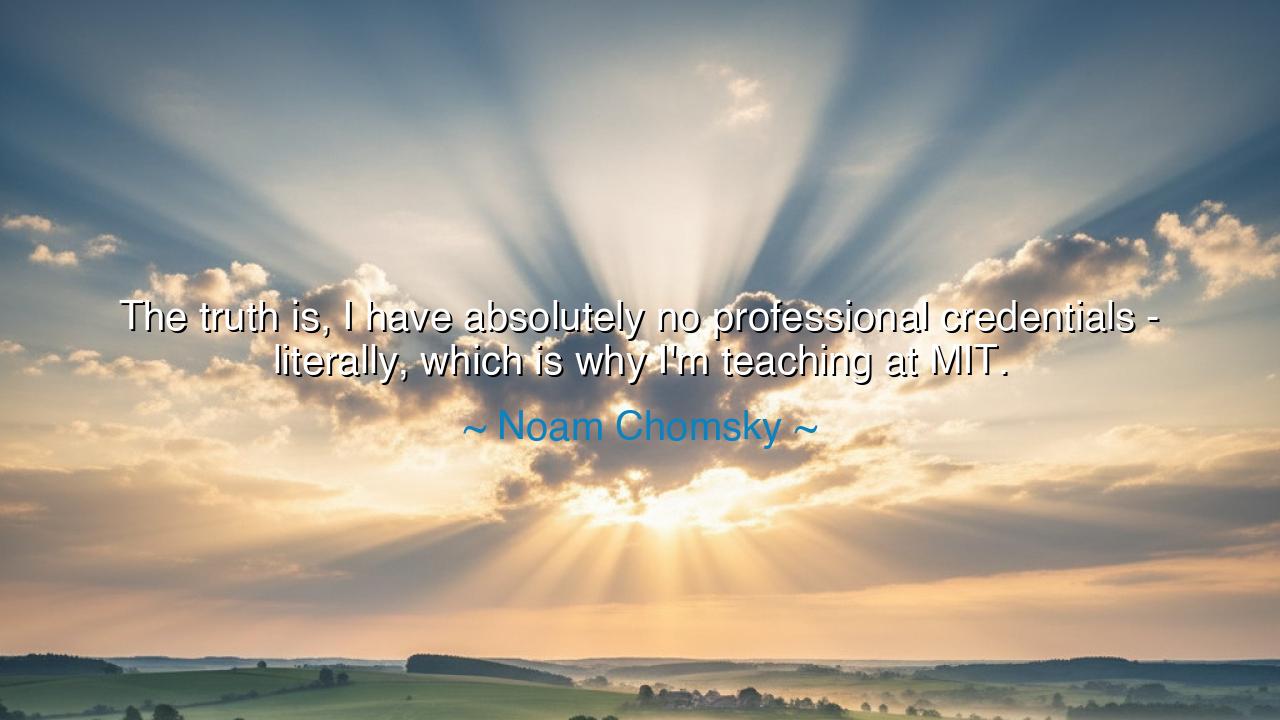
The truth is, I have absolutely no professional credentials -
The truth is, I have absolutely no professional credentials - literally, which is why I'm teaching at MIT.






The words of Noam Chomsky—“The truth is, I have absolutely no professional credentials—literally, which is why I’m teaching at MIT”—are spoken with the humility and irony of one of the greatest intellectuals of modern times. On the surface, his statement appears almost absurd: how can a man who transformed the study of language, politics, and philosophy say he has no credentials? Yet within this paradox lies a profound lesson: that true wisdom and true authority come not from titles, certificates, or institutional approval, but from the power of truth, insight, and the courage to pursue knowledge freely.
In these words, Chomsky reflects the spirit of the ancients, who often distrusted credentials and worldly honors. Socrates, who shaped the entire tradition of Western philosophy, held no title, no official recognition. He wandered the streets of Athens, questioning the mighty and the ordinary alike, declaring that his wisdom lay in knowing he did not know. Like Chomsky, he stood as a witness to the truth that the deepest authority does not come from a seal on a diploma, but from the clarity of mind and the pursuit of truth with relentless honesty.
The origin of Chomsky’s remark lies in his unusual academic journey. He entered MIT at a time when the field of linguistics was hardly formalized. His work did not follow the credentials of law, medicine, or even traditional philosophy—it was born from a radical reimagining of human language as a window into the mind itself. His theories shook the foundations of linguistics and spread into psychology, computer science, and politics. In saying he had “no professional credentials,” he reminds us that innovation often comes from those who walk outside the beaten path, who dare to follow curiosity rather than the rigid steps of convention.
History gives us many examples of this truth. Consider Leonardo da Vinci, the man of the Renaissance. He was not a credentialed physician, yet his anatomical sketches revealed the secrets of the human body. He was not a certified engineer, yet he designed machines far ahead of his time. His authority came not from a university, but from observation, imagination, and discipline. Like Chomsky, Leonardo shows that great minds are not limited by the walls of institutions. Credentials may be useful, but they are not the measure of genius.
Yet, Chomsky’s words also carry a subtle irony. He taught at MIT, one of the world’s greatest bastions of learning, surrounded by the very machinery of credentials, degrees, and academic prestige. His statement is therefore a challenge to us: do not mistake the symbol of learning for learning itself, nor the parchment for the spirit of wisdom. Institutions may recognize greatness, but they do not create it. True authority lies in the ability to uncover truth and to teach it, regardless of whether society has stamped its approval.
The lesson for us is clear: do not let the lack of credentials become an excuse to stop seeking wisdom, nor let the possession of credentials deceive you into thinking you have attained it. Knowledge is not sealed in paper but written in the mind and lived in the heart. Be courageous enough to seek truth outside the boundaries of convention, to study not for recognition but for understanding, and to act not for applause but for justice.
Therefore, O seeker, remember Chomsky’s words: credentials are shadows, but truth is substance. Do not despise learning, nor the institutions that preserve it, but do not worship them either. The true measure of your worth lies not in what the world grants you, but in what you see, know, and share in the service of others. Walk in truth, cultivate wisdom, and let your authority be the strength of your insight. Then, like Chomsky, your life will testify that it is not titles that teach, but truth itself.






MCmanh cuong
Chomsky's candidness is refreshing, but it raises the question of how many other brilliant minds may be overlooked simply because they lack the right credentials. Is our society too focused on paper qualifications? Can someone truly be an expert without the traditional credentials? What might our education system look like if we placed more emphasis on intellectual contribution than on degrees?
THNguyen Thi Hanh
Noam Chomsky’s quote sheds light on an important issue about the value of knowledge over formal credentials. If he can teach at MIT without official credentials, does it suggest that true mastery comes from experience and intellectual engagement, rather than degrees? It makes me wonder if our educational systems should evolve to focus more on real-world expertise rather than on paper qualifications.
DHDieu hien
It’s fascinating to hear Chomsky admit that he doesn’t have professional credentials, yet still holds such an esteemed position. It makes me wonder: how often are we held back by the idea that we need formal qualifications to succeed? Could there be more room for those with passion, experience, and expertise, even if they don’t have traditional credentials?
VCNgo Loi Vo cua
This quote challenges the conventional idea that professional success and teaching positions depend on formal credentials. I find it both humbling and inspiring that someone like Chomsky, known for his groundbreaking ideas, might not have the ‘traditional’ qualifications we expect from educators. Does this open the door for more people to contribute to academia and other fields without being bound by strict qualifications?
TTTrang Nguyen thi thuy
Chomsky’s statement seems to poke fun at the irony of academia—someone without formal credentials teaching at MIT. But it also brings up a valid point: Does formal education really define expertise? In a world where experience and insight can outweigh degrees, should we rethink the value we place on traditional qualifications? What does it say about the system when someone like Chomsky can teach without them?